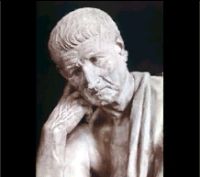|
The Column: Hello and Welcome! Let's talk about Alchemy. Alchemy is the ancient practice of discovering substances that will transmute the more common metals into gold or silver and to finding a means of indefinitely prolonging human life. Although its purposes and techniques were often dubious and illusory, alchemy was in many ways the predecessor of modern science, especially the science of chemistry, and the beginnings of various schools of philosophical and religious thoughts on transforming the self and your surrounding reality. The birthplace of alchemy was ancient Egypt where a strange mix of early science and philosophy took place. Often various smiths and construction workers were employed in the creation of the temples of higher learning and spiritual practices. Early adepts would watch the various metals being created in the construction of the temple and birthed a spiritual philosophy on it. As such the writings of some of the early Egyptian and Greek philosophers might be considered to contain the first chemical theories. This theory was advanced by Empedocles when he proposed that all things are composed of air, earth, fire, and water -- which not only is the basis for modern chemistry, but for the more etheric magical arts and philosophical thoughts. The fundamental concept of alchemy (chemical and philosophical) stems from Aristotelian doctrine that states that "All things tend to reach perfection." Because other metals were thought to be less “perfect” than gold, it was reasonable to assume that nature formed gold out of other metals deep within the earth and that with sufficient skill and diligence an artisan could duplicate this process in the workshop. This same Alchemical process was also applied to the development of the human soul. The divine soul was considered the gold and the human soul the part that must be transformed into its more pure state. Later on as astrology, magic, and ritual began to gain prominence, the philosophical side of alchemy took a turn for the worse. Magical alchemy often became a way to take advantage of others through deceit, fear, or even by manipulation of the unseen forces of the mind and of the earth. It was at this time that witchcraft became the unwitting recipient of the push to eradicate all kinds of magic and alchemy, as witches were often cooking or creating various potions and natural remedies and their practices were not as secret as many of these dubious persons or organizations. Alchemy for the most part has come along way since the beginning. In many ways it has fueled our technological society as well as our own philosophical and spiritual practices. The philosophical and the technological both strive for completion and perfection and to accomplish this goal both go deeper and deeper till the perfect self or substance emerges. The alchemy we deal with here in this website is more of the philosophical and spiritual flavor but let's not forget that most of technology and human comforts of today came from the other side of alchemy, the chemical side, which had its roots in finding that perfect substance to change lead into gold... Till next month! Alchemy Links
|
Alchemy
TimeLine:
 al�che�my (�l�k�-m�) n. 1. A medieval chemical philosophy having as its asserted aims the transmutation of base metals into gold, the discovery of the panacea, and the preparation of the elixir of longevity. 2. A seemingly magical power or process of transmuting. --al�chem�i�cal (�l-k�m�-�-k�l) or al�chem�ic adj. oc�cult�ism (Latin occulere, "to hide"), belief in the efficacy of various practices-including astrology, alchemy, divination, and magic-regarded as being based on hidden knowledge about the universe and its mysterious forces. witch�craft (w�ch�kr�ft�) n. 1. Magic; sorcery. 2. Wicca. 3. A magical or irresistible influence, attraction, or charm. |
This article is from the current Reality Creator Series Books, or upcoming books, or website content. © copyright 1995 - 2024 by Tom DeLiso